

Johannes de Sacrobosco. Heavily annotated copy of De Sphaera of Sacrobosco.
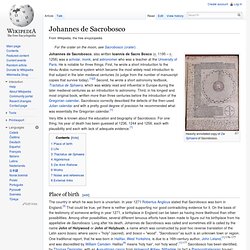
Johannes de Sacrobosco, also written Ioannis de Sacro Bosco (c. 1195 – c. 1256) was a scholar, monk, and astronomer who was a teacher at the University of Paris. He is notable for three things. First, he wrote a short introduction to the Hindu-Arabic numeral system which became the most widely read introduction to that subject in the later medieval centuries (to judge from the number of manuscript copies that survive today).[1][2] Second, he wrote a short astronomy textbook, Tractatus de Sphaera, which was widely read and influential in Europe during the later medieval centuries as an introduction to astronomy.
Richard Feynman: Physics is fun to imagine. Ibn Tufail. Athanasius Kircher. Athanasius Kircher, S.J. (1601 or 1602 – 1680) (sometimes erroneously spelled Kirchner) was a 17th-century German Jesuit scholar and polymath who published around 40 major works, most notably in the fields of Oriental studies, geology, and medicine.
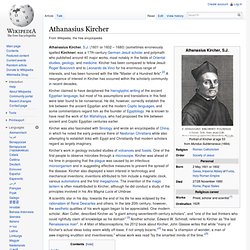
Lucretius. First published Wed Aug 4, 2004; substantive revision Sat Aug 10, 2013 Titus Lucretius Carus (died mid to late 50s BCE) was an Epicurean poet of the late Roman republican era.
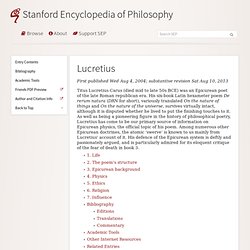
His six-book Latin hexameter poem De rerum natura (DRN for short), variously translated On the nature of things and On the nature of the universe, survives virtually intact, although it is disputed whether he lived to put the finishing touches to it. As well as being a pioneering figure in the history of philosophical poetry, Lucretius has come to be our primary source of information on Epicurean physics, the official topic of his poem. Among numerous other Epicurean doctrines, the atomic ‘swerve’ is known to us mainly from Lucretius' account of it. His defence of the Epicurean system is deftly and passionately argued, and is particularly admired for its eloquent critique of the fear of death in book 3. 1. We know virtually nothing, beyond what little can be inferred from the poem itself, of Lucretius' biography. Video. Leon Battista Alberti. Leon Battista Alberti[1] (February 14, 1404 – April 25, 1472) was an Italian humanist author, artist, architect, poet, priest, linguist, philosopher and cryptographer; he epitomised the Renaissance Man.
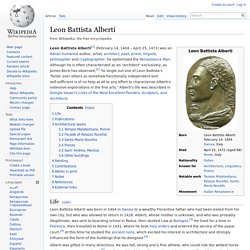
Although he is often characterized as an "architect" exclusively, as James Beck has observed,[2] "to single out one of Leon Battista's 'fields' over others as somehow functionally independent and self-sufficient is of no help at all to any effort to characterize Alberti's extensive explorations in the fine arts. " Alberti's life was described in Giorgio Vasari's Lives of the Most Excellent Painters, Sculptors, and Architects. Life[edit] Darwin. List of Jesuit scientists. This is a list of Jesuit scientists, who contributed somehow to history of science.
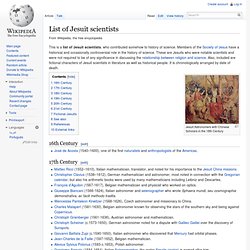
Members of the Society of Jesus have a historical and occasionally controversial role in the history of science. Quakers in science. The Religious Society of Friends (commonly known as Quakers) encouraged some values which may have been conducive to encouraging scientific talents.
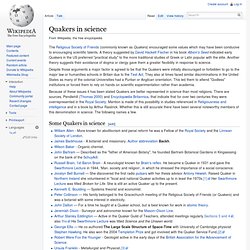
A theory suggested by David Hackett Fischer in his book Albion's Seed indicated early Quakers in the US preferred "practical study" to the more traditional studies of Greek or Latin popular with the elite. Another theory suggests their avoidance of dogma or clergy gave them a greater flexibility in response to science.
Despite those arguments a major factor is agreed to be that the Quakers were initially discouraged or forbidden to go to the major law or humanities schools in Britain due to the Test Act. They also at times faced similar discriminations in the United States as many of the colonial Universities had a Puritan or Anglican orientation. This led them to attend "Godless" institutions or forced them to rely on hands on scientific experimentation rather than academia. John Harrison. John Harrison (3 April [O.S. 24 March] 1693– 24 March 1776) was a self-educated English carpenter and clockmaker.
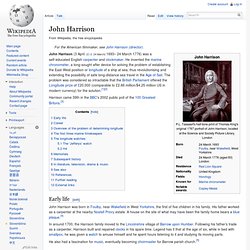
He invented the marine chronometer, a long-sought after device for solving the problem of establishing the East-West position or longitude of a ship at sea, thus revolutionising and extending the possibility of safe long-distance sea travel in the Age of Sail. The problem was considered so intractable that the British Parliament offered the Longitude prize of £20,000 (comparable to £2.66 million/$4.25 million US in modern currency) for the solution.[1][2] Harrison came 39th in the BBC's 2002 public poll of the 100 Greatest Britons.[3] Early life[edit] John Harrison was born in Foulby, near Wakefield in West Yorkshire, the first of five children in his family. In around 1700, the Harrison family moved to the Lincolnshire village of Barrow upon Humber.
He also had a fascination for music, eventually becoming choirmaster for Barrow parish church.[5] List of people who have been called "polymaths" Karl Popper. 1.
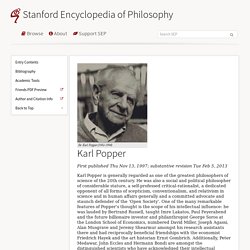
Life Karl Raimund Popper was born on 28 July 1902 in Vienna, which at that time could make some claim to be the cultural epicentre of the western world. His parents, who were of Jewish origin, brought him up in an atmosphere which he was later to describe as ‘decidedly bookish’. His father was a lawyer by profession, but he also took a keen interest in the classics and in philosophy, and communicated to his son an interest in social and political issues which he was to never lose. His mother inculcated in him such a passion for music that for a time he seriously contemplated taking it up as a career, and indeed he initially chose the history of music as a second subject for his Ph.D. examination. Popper married Josephine Anna Henninger (‘Hennie’) in 1930, and she oversaw his welfare with unflagging support and devotion, serving additionally as his amanuensis until her death in 1985. 2. 3. 4. How then does the deductive procedure work? 5. Thomas Kuhn: Paradigms and what is Science? (lowres)
Claude Bernard. Claude Bernard (12 July 1813 – 10 February 1878) was a French physiologist.
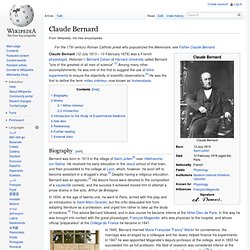
Zu Chongzhi. Statue of Zu Chongzi in Tinglin Park in Kunshan Zu Chongzhi (429–500), courtesy name Wenyuan, was a prominent Chinese mathematician and astronomer during the Liu Song and Southern Qi Dynasties.
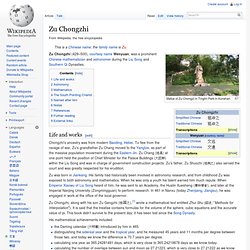
Life and works[edit] Chongzhi's ancestry was from modern Baoding, Hebei.